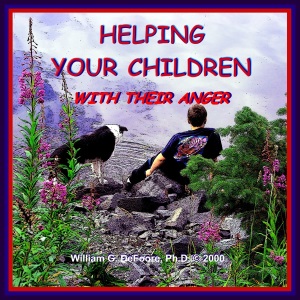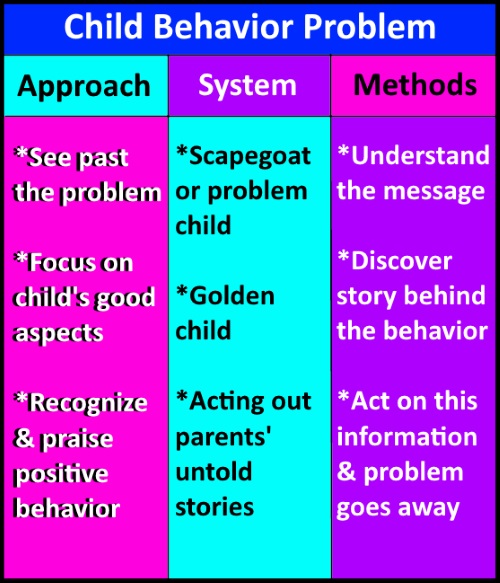Resolve Your Child Behavior Problem
Through Understanding, Love & Parenting Tips
Authored by William G. DeFoore, Ph.D.

A child behavior problem is there for a reason. And the reason is never just because he's a bad kid. The behavior can certainly make him seem bad...and that's one of the reasons it's so hard to help him.
Your child is good. Even though he may have some pretty bad behavior, there is still a lot of goodness there. One of your first steps is to start looking for and focusing on what is good, right and workingabout your child.
Here is an overview of what you will gain from this article:

Now let's dive deeper into each of these points. You will find this to be a unique and thought-provoking approach that you won't find anywhere else.
It is based on my 40+ years of professional experience, and this is what I believe actually works the best in helping parents deal with a child behavior problem.

How To Approach Your Child Behavior Problem
Never underestimate the power and importance of your mindset regarding your child. You have tremendous influence on his self-image, for example, and the more you can contribute to his self-esteem and self-respect, the better he will behave.
- See past the problem -- Sometimes the problem is so upsetting that it's hard to see past it. The idea is that there is more to your child than this one problem, and it's very important that you keep this in mind all of the time, especially when you are interacting with him.
- Focus on the child's good aspects -- Anything and everything you can think of that is good, right and working about your child deserves and desperately needs your focus. Use these positive journaling practices, and write daily about what you love, like and appreciate about your child. This will bring you into a more emotionally balanced state, and you will make better decisions and think more clearly as a result.
- Recognize & praise positive behavior -- Then, of course, it's important that you tell him what you love and appreciate about him. Children are much more likely to change their behavior if they feel that you love them, and that they are basically good.
This approach is designed to help you focus on your child's strengths, while you work to help them overcome their areas of weakness. This just works better than focusing on what's wrong with him so much that he starts to feel hopeless...and gives up on getting better.

HELPING YOUR CHILDREN WITH THEIR ANGER:
A Guide
For Parents of Children and Adolescents
Powerful and effective! Get the control you need and teach your children control with successful child anger management techniques.
This audiobook is designed to help parents understand and teach their children effective anger management skills. Listen to Dr. DeFoore as he teaches you exactly what to do

Discover How The Problem Fits In The Family System
Every family is a system, with spoken and unspoken rules and roles that members follow. Often what is happening with a child behavior problem is that the child is unconsciously caught in playing a role in the family system, to his own detriment.
Let's look at some of these roles now:
- Scapegoat or problem child -- A child falls into this role for a number of different reasons. Some children are naturally more energetic, rebellious and and independent. This will cause them to break rules, and go against parents' wishes, and that's when they get labeled as the problem child. Then the worst case is when that whole family starts scapegoating the child, blaming him for virtually everything that goes wrong.
- Golden child -- Children fall into this role when they are favored, spoiled, or seen as special and better than their siblings or other children. This creates an inflated sense of self importance in the child, where he feels that the world owes him something because he's so special. Then, inevitably, the "world" lets him down, and he behaves badly, displaying anger, for example.
- Acting out parents' untold stories -- When parents have significant stories from their past that have never been explored or shared, some children will pick up on these stories (mostly through nonverbal communication), and begin unconsciously acting them out. This can lead to a very severe and baffling child behavior problem, because nobody understands where it's coming from. Parents need to appropriately share their own stories with their children to prevent this.
The best treatment approach for each of these types of child behavior problem is family therapy, ideally with all family members present. However, any combination of family members will work if some members cannot attend.
Make inquiries about family counseling with Dr. DeFoore here.

Methods For Solving A Child Behavior Problem
The important thing is that parents never give up on their child, or consider him a "lost cause." There are solutions, and while they may not always be easy, it's far better to keep trying than to give up.
Let's look at some basic methods for approaching resolution of these types of problems.
- Understand the message behind the problem. -- Children usually don't know why they're acting out, and even if they think they know, there is almost always an underlying issue. Our task as adults is to understand the true underlying message they're trying to convey with their behavior. Once that message is heard, honored, the child's emotions will be released, which begins the healing process.
- Discover the story behind the behavior. -- There is almost always a deeper underlying "story" behind your child's behavior problem. This may be a story of abuse, neglect or abandonment from the child's past, or it could be related to some type of social pressure at school or with his peers. When the story is told and appropriately heard...by a caring, responsible adult, the child no longer feels so alone, and starts to believe in the possibility that things can get better.
- Act on this information and the problem goes away. -- Sometimes it seems almost like magic, when parents and families make adjustments, tell their stories and hear each others' stories in a loving and respectful manner. The child's role in the family system no longer requires him to behave badly, and his behavior can then become more appropriate.
Wise, healthy parents can often implement some of these solutions on their own, without counseling. Learn more about some parenting tips you can use in your home to help your children with behavior problems.
- Home
- Child Anger
- Child Behavior Problem
We receive commissions on Amazon sales on this website.





New! Comments
Have your say about what you just read! Leave me a comment in the box below.